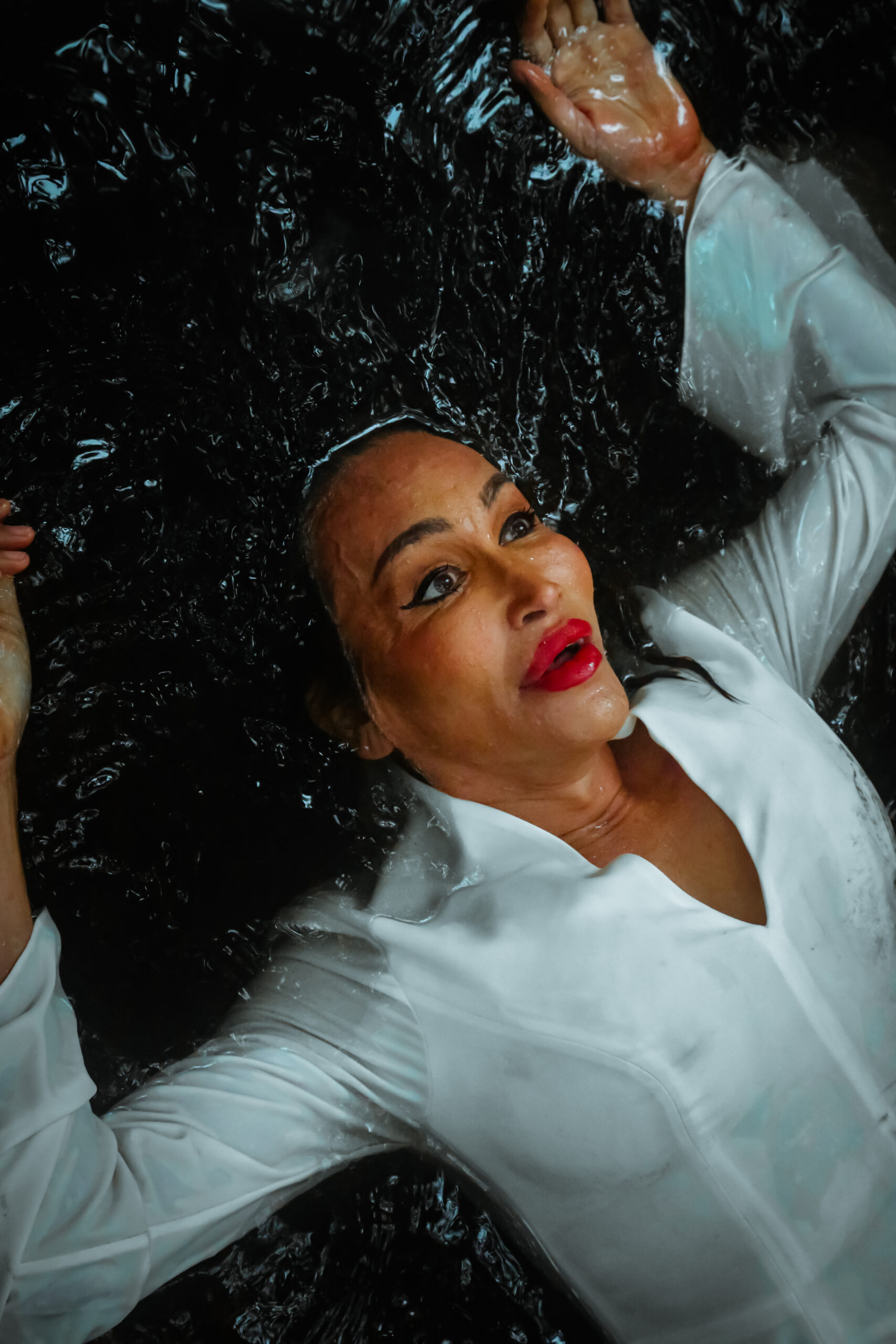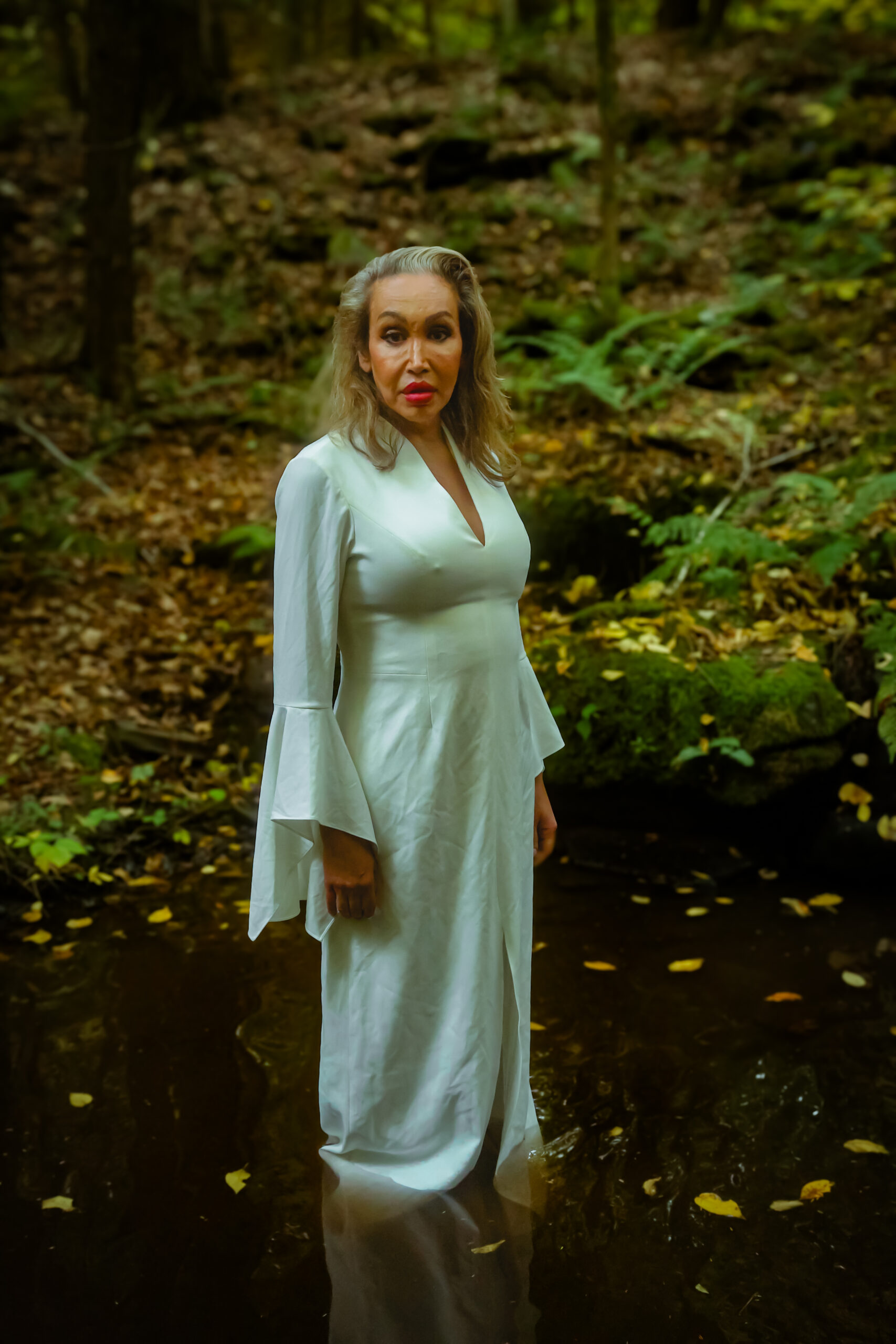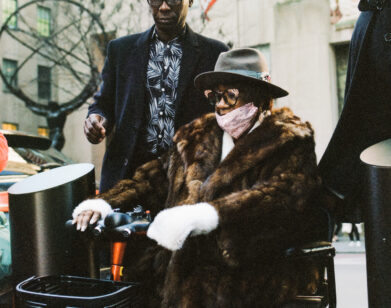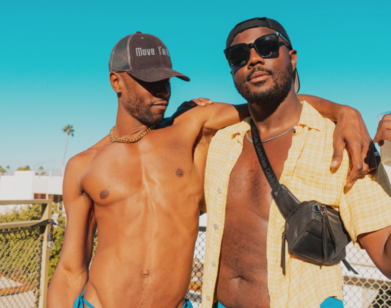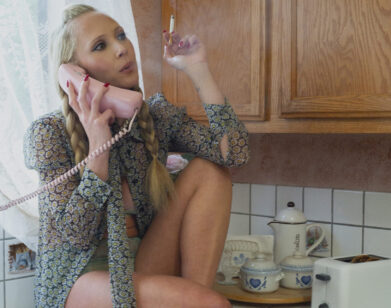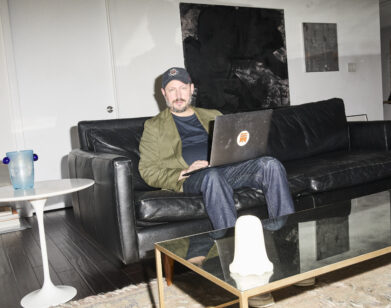ICON
Cecilia Gentili Is Looking for God in Her New One-Woman Show
The first time I met Cecilia Gentili, we were standing in the backyard of a mutual friend’s house, shading our eyes as we stared up at the abandoned church that loomed in a neighboring lot. I already knew who she was, of course; she was the activist who spoke at all the rallies, the occasional guest star on Pose, the charismatic storyteller I’d sometimes catch at readings, the lady at Apicha who’d given half my friends hormones. I racked my brain for something to say just so I could talk to her. I told her how some of the other people who’d come to this trans brunch potluck had climbed our friends’ fence to explore the inside of the church. She kept staring at it, though, too lost in thought to respond. “It’s so sad,” she finally said. “People could live there.” And with a crick of the monkey’s paw, now people do, in a brand-new condo building, which is not quite what she had meant.
Many years and an actual, organically developed friendship later, I returned to talk churches with Cecilia once more. Last week, she told me all about her uproarious new one-woman show opening this week at New York’s Rattlestick Theater, Red Ink, which pokes fun at her earliest experiences with religion and happens to mark her off-Broadway debut. She also discussed her recent attempts at living a more pious life, beginning with a pilgrimage to what she calls “the gayest place I’ve ever seen,” Palm Springs.
———
HARRON WALKER: Look who it is. How are you doing, Cecilia?
CECILIA GENTILI: I’m okay. I’m fucking busy. I was in Denver working at a conference, and then I went to a gala for the LGBTQ Community Center of the Desert, which is in Palm Springs. The Palm Springs life is a life that everybody should experience.
WALKER: What’s the Palm Springs life like?
GENTILI: It’s just a whole bunch of older gay men, many of them with a lot of plastic surgery, living in the middle of the desert. Palm Spring is the gayest place I’ve ever seen. Everybody looked like they may be 70, but they look 49. Which is the goal.
WALKER: I want to be on death’s door and still look 49, at the oldest.
GENTILI: I was talking with a plastic surgeon, and he was like, “But you’ve done all the things that you need to do for your feminization.” And I’m like, “The goal is no longer to look more feminine. The goal is to look young.”
WALKER: You know, I just had my hairline done a month ago with Hazen in New York. This is not a sponsored mention.
GENTILI: That’s exactly what I want.
WALKER: They have to buzz the back of your head in a certain part, so I just have an undercut back here.
GENTILI: Which kind of makes you a lesbian. The buzz was a very lesbionic thing in the early 2000s.
WALKER: Oh, yeah. In sixth and seventh grade I would grow out my bangs but buzz the whole rest of the head. There was some gender going on there, for sure, and my brother years later said all the lesbians had that exact haircut when he was in high school.
GENTILI: But then it was a Karen thing, right?
WALKER: Oh, yeah. Like Kate Gosselin. So, are you here in the city, or are you upstate?
GENTILI: I am home. I’m in the city, but I bought a house upstate. It’s amazing, Harron. I don’t know if you saw the promo that Oscar [Diaz] did for the show.
WALKER: I did. You’re floating in the river like Ophelia or something.
GENTILI: That is in the backyard of my house. I have a creek with a waterfall that leads to a reservoir. The house is a dream. It’s 10 acres of nature.
WALKER: Were you nervous at all about leaving New York behind?
GENTILI: Well, I haven’t fully. I still live here in Brooklyn—with my partner, so I don’t have to pay rent. That’s why I was able to buy this house. So I guess that makes Peter my last partner because if I leave him, I have to pay rent. Not that I’m with Peter just for the rent, but part of it is.
WALKER: It’s a consideration in New York relationships.
GENTILI: I mean, a relationship that gives you housing is a serious relationship. I don’t care how good you are at sex. You give me housing, you’re my boyfriend or girlfriend or partner.
WALKER: Yeah, and in New York, the insane rent prices kind of drive that conversation forward. I moved in with an ex of mine after five months, but I don’t think we would’ve done that if rent hadn’t been a consideration. We broke up right when the lease ended a few years later, and we’re still friends.
GENTILI: I don’t know how the queers do that. I broke up with someone a couple years ago and he wanted to be friends. And I’m like, I’m ‘80s. You break up with the partner and you hate them and you never talk to them again. We’re friends now, and I am happy that I’m able to be friendly with him. But it was hard to be friendly with someone you’re sexually attracted to. It’s a new experience for me.
WALKER: Speaking of new experiences, you’re making your off-Broadway debut with your one-woman show. How does that feel?
GENTILI: It feels amazing. I am still trying to grasp the idea of having an off-Broadway show, because it wasn’t really planned. It just kind of fell in my lap, and I am incredibly grateful to be able to present this show at Rattlestick, which is such a beautiful space and means so much to me as a queer person. I’m really, really happy. I cannot lie.
WALKER: That’s so great. Where did Red Ink begin?
GENTILI: When I wrote my book, Faltas: Letters to Everyone in My Hometown Who Isn’t My Rapist, the book was a reaction to a show I did about my immigration status. When I got my status in this country, it was a really painful set of memories. So in order to balance that, I did a show called The Knife Cuts Both Ways. That was all fun, funny stories. Then the idea with the book was to find some level of fun and pain. But a lot of people read the book and kept paying attention to the trauma. Nobody comes and says, “it was so funny,” which was what I envisioned. The title, Letters To Everyone In My Hometown Who Isn’t My Rapist, kind of put people in a grim attitude going into the book just because it touched on the idea of rape. So this show is the reaction to that, and it’s all fun stories from my childhood. Some of them are in the book, but depending how you read them, they may come across as painful, so I thought, maybe I have to tell these stories so people know that I meant them in a fun, funny way.
WALKER: There are some of those moments. Like the letter to Ines, the woman who your dad left your mom for but never ultimately married. I think it’s masterfully hilarious how you’re kind of baiting the reader with seeking forgiveness. And you’re like, “of course I have you in my heart because you are still not married and I am, and that must be really hard for you.” You basically end on, “And by the way, bitch, fuck you.”
GENTILI: But you would be surprised how many people find that letter traumatic.
WALKER: One thing I’ve learned too is that I can’t know everything that’s in whatever I’ve written until someone responds to it, if that makes sense. It doesn’t mean my understanding of it isn’t the same. Readers can kind of take anything anywhere.
GENTILI: I guess I have read books that I thought were one thing and they were another. But the show is also a reaction to this specific moment in my life where I’ve been trying to have this house upstate. One of the things that my partner always asks is, “What are we going to do upstate?” And I’m like, “We’re going to go to church on Sundays.”
WALKER: Really?
GENTILI: Yeah, I have been reexamining my relationship with religion for a long time. I went to treatment for drug use for 17 months. At the time, I was sleeping with men, and there was no direction on how to treat a trans woman. Sometimes it was fun, but it was not the best thing for me. I am now in a harm reduction approach to drugs, but at that time, I was in abstinence, so I was also going to NA groups. In NA, it’s a lot about your relationship with God. Even if you go to the agnostic ones, I felt like I couldn’t do the program because I didn’t have a god. I just never had opportunities to experience a faith that was fully embracing of me. Religion is such a complicated issue for most queer and trans people. I used to go with my grandmother to the Baptist church, and they didn’t want me there. They made it very clear. I used to go to the Catholic church, too, and both were such traumatic experiences for me as a queer person. So I came to identify as an atheist, but I know that so many trans people have been able to find a relationship with faith in spaces that include them.
WALKER: I wasn’t raised Catholic. My mom’s whole joke about it is, “I was raised Catholic, so why would I raise you Catholic?” She was always telling me stories about nuns punishing you, putting you in the coat closet or having you hold buckets of water.
GENTILI: I was put to pray over kernels of corn. It was really bad. But I come from a family of so many different faiths, so I didn’t feel attached to any of them. I had so many choices, but none of them felt right because I was queer. At the time, there was no openness. Nowadays, some churches have queers pastors or rabbis or imans. I remember I had a friend when I was starting my transition as a teenager. She would invite me to pray with her. And I was like, “What are we praying to?” And she’d say, “No, we are praying. There’s a lot of power in the act of just praying.” It was therapeutic.
WALKER: So have you been attending any services upstate?
GENTILI: I went to a service, and it was really nice.
WALKER: What denomination, if I can ask?
GENTILI: It was a Russian Orthodox place. A lot of churches up there are more Eastern Europeans.
WALKER: Interesting. So much of a childhood relationship with religion is like, if your parents are going, then you’re going. How does it feel to be able to make that choice for yourself now?
GENTILI: It feels good to go to church, not because I fully agree with this church. But walking in a space that is considered a temple gives me goosebumps every time. And maybe people don’t know about me, and nobody will have an opportunity to make me feel uncomfortable here. Even if I don’t believe in the same things they believe, it’s a magical experience.
WALKER: You’ve been telling stories before audiences for the past decade all over the country. I remember seeing you read in 2019 at Bluestockings in New York. You’re up there by yourself, totally in control of the crowd. What is it like now, bringing all these other people in, with Gogo [Graham] designing your wardrobe, Sasha Velour on the projections, and Adam Honoré doing the lighting?
GENTILI: Yeah. I trust them all. I trust them all because of their work, but also because they are family. I came to understand that giving some of that power away only makes things better. And I trust the director. Nic [Cory] has been fundamental. The show was just an idea, me telling stories, like you saw at Bluestockings. He made them make sense together and added the lights and the wardrobe to make it a show. He always says, “You have us in your hand. Let people come to you.” He always mentions that I’m a good actress, which feels great because I don’t consider myself a good actress.
WALKER: No, I saw you at the Wild Project in the earlier run of Red Ink, and you were an incredible actress. Has the show evolved since then? Are you still taking random stray shots at Chiquitita throughout it?
GENTILI: Of course. [Laughs]
WALKER: Has she gotten to see the show?
GENTILI: Yeah, she laughed a lot and she said that I’m an old worthless whore. And I am. I’m obsessed with her. I see so much of myself in her. And the show has evolved. The beauty of it is to make it not sound scripted, but I feel like it’s now an actual theater piece. The lights have changed, and now I have directions and everything is staged. So it feels much more professional.
WALKER: In the past, when we’ve talked about performance, you said it goes back to when you used to work in clubs and you had this superpower to read a room and know how to keep the vibes up. You feel like you have the audience in your hand, and if you want to tease something out, you can. Do you still find room for that, or are you very committed to the script?
GENTILI: I am much more committed because, for example, the lights are extremely attached to the text.
WALKER: I remember one of the big cues is when everything suddenly turns red right when you scream. It goes from this very airy, heavenly blue to hellfire red. Speaking of faith, you must have a lot of faith in the text then.
GENTILI: Yeah. And how cool is it that I can experience all these things that I am feeling about religion in a show? Some people don’t even get to question their relationship with religion, and I get to question it in an off-Broadway show. Religion has been such a foundational aspect of my life that I’ll always have some kind of connection to it. I still crave a sense of community and belonging that I know a lot of people find in faith.
WALKER: And for everything else, there’s Palm Springs.

